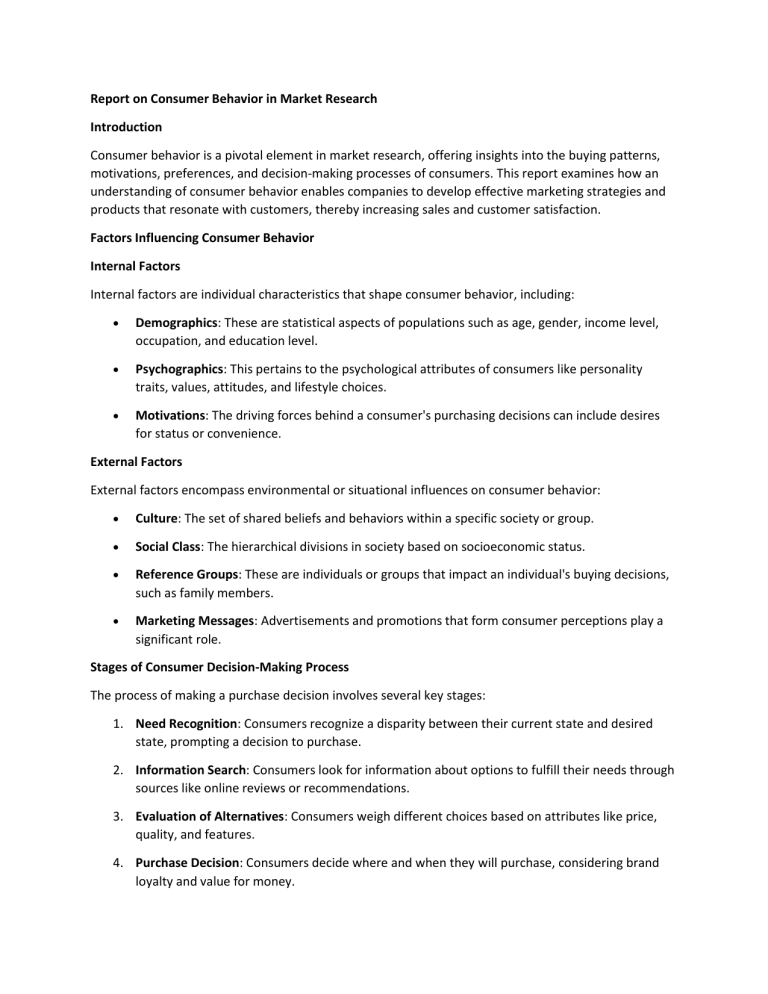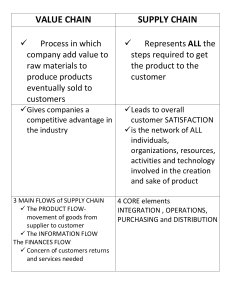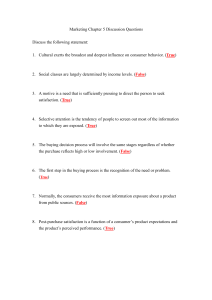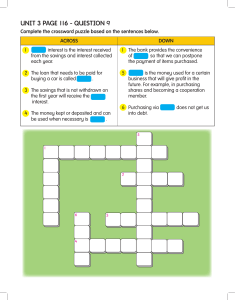
Report on Consumer Behavior in Market Research Introduction Consumer behavior is a pivotal element in market research, offering insights into the buying patterns, motivations, preferences, and decision-making processes of consumers. This report examines how an understanding of consumer behavior enables companies to develop effective marketing strategies and products that resonate with customers, thereby increasing sales and customer satisfaction. Factors Influencing Consumer Behavior Internal Factors Internal factors are individual characteristics that shape consumer behavior, including: Demographics: These are statistical aspects of populations such as age, gender, income level, occupation, and education level. Psychographics: This pertains to the psychological attributes of consumers like personality traits, values, attitudes, and lifestyle choices. Motivations: The driving forces behind a consumer's purchasing decisions can include desires for status or convenience. External Factors External factors encompass environmental or situational influences on consumer behavior: Culture: The set of shared beliefs and behaviors within a specific society or group. Social Class: The hierarchical divisions in society based on socioeconomic status. Reference Groups: These are individuals or groups that impact an individual's buying decisions, such as family members. Marketing Messages: Advertisements and promotions that form consumer perceptions play a significant role. Stages of Consumer Decision-Making Process The process of making a purchase decision involves several key stages: 1. Need Recognition: Consumers recognize a disparity between their current state and desired state, prompting a decision to purchase. 2. Information Search: Consumers look for information about options to fulfill their needs through sources like online reviews or recommendations. 3. Evaluation of Alternatives: Consumers weigh different choices based on attributes like price, quality, and features. 4. Purchase Decision: Consumers decide where and when they will purchase, considering brand loyalty and value for money. 5. Post-Purchase Evaluation: After buying, consumers evaluate their decision and level of satisfaction with the product or service. Market Research Techniques To study consumer behavior, market research employs various techniques: Surveys: These involve collecting data via questionnaires or interviews to record consumer preferences and behaviors. Observation: Observing consumers in real situations provides insights into their purchasing behavior. Focus Groups: A small group representing a target market is gathered to discuss certain products or concepts. Experimentation: Controlled experiments help observe and measure responses to different marketing stimuli. Importance of Consumer Behavior in Market Research Product Development: Understanding consumer needs aids in designing products that cater to customer desires. Marketing Strategy: Identifying target markets and influencers of buying decisions allows for creating tailored marketing campaigns. Competitive Advantage: Knowledge of consumer behavior provides a competitive edge through differentiation in pricing, quality, features, or branding. Customer Satisfaction: Grasping customer preferences leads to meeting expectations and improved satisfaction levels. Business Growth: Analyzing consumer behavior identifies new growth opportunities by spotting untapped markets or emerging trends. Conclusion The study of consumer behavior is fundamental for market researchers as it provides invaluable insights into the reasons behind consumers' purchasing choices. This knowledge equips companies to craft compelling products and marketing strategies that drive success and competitive advantage in the marketplace.



